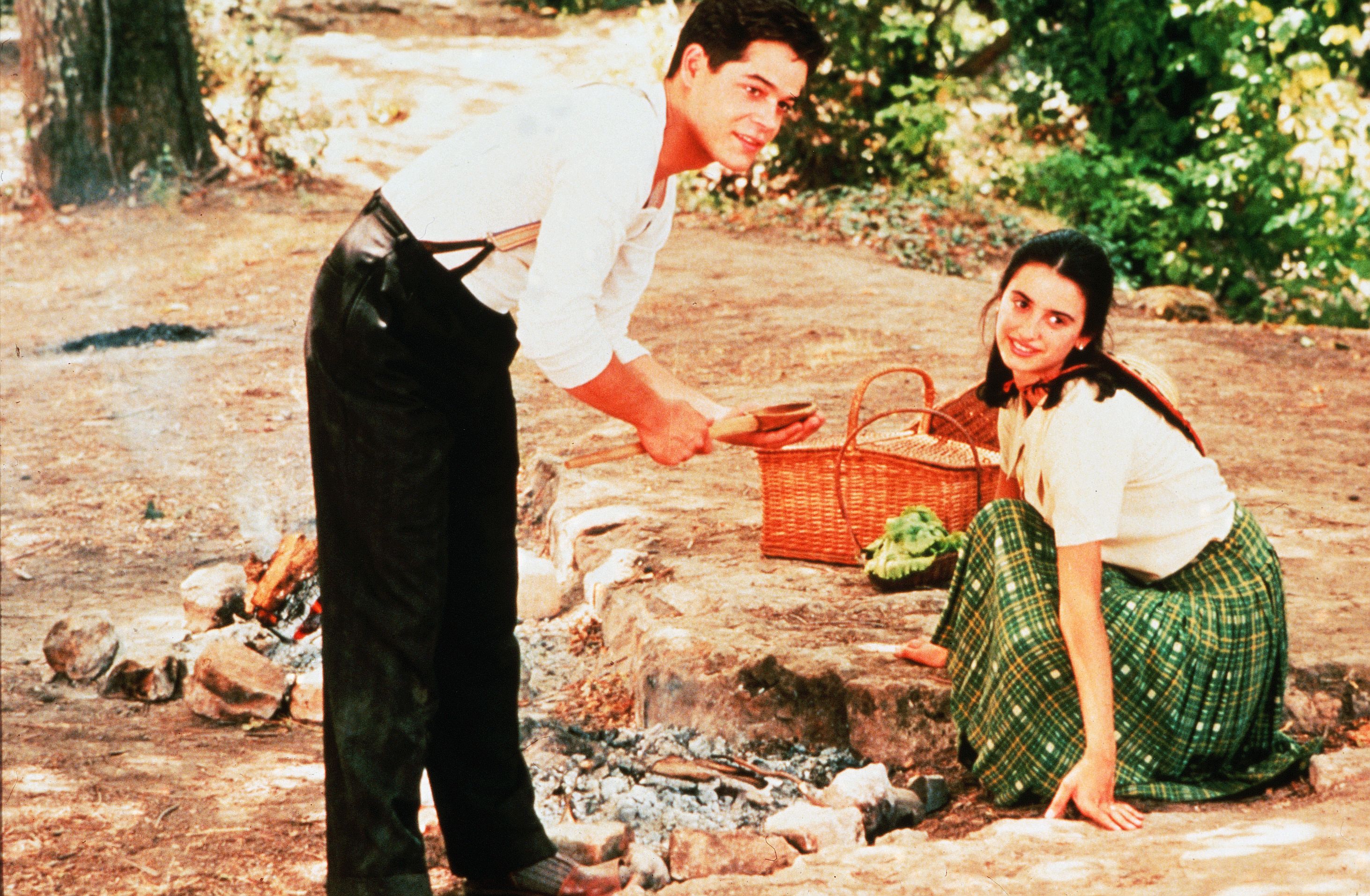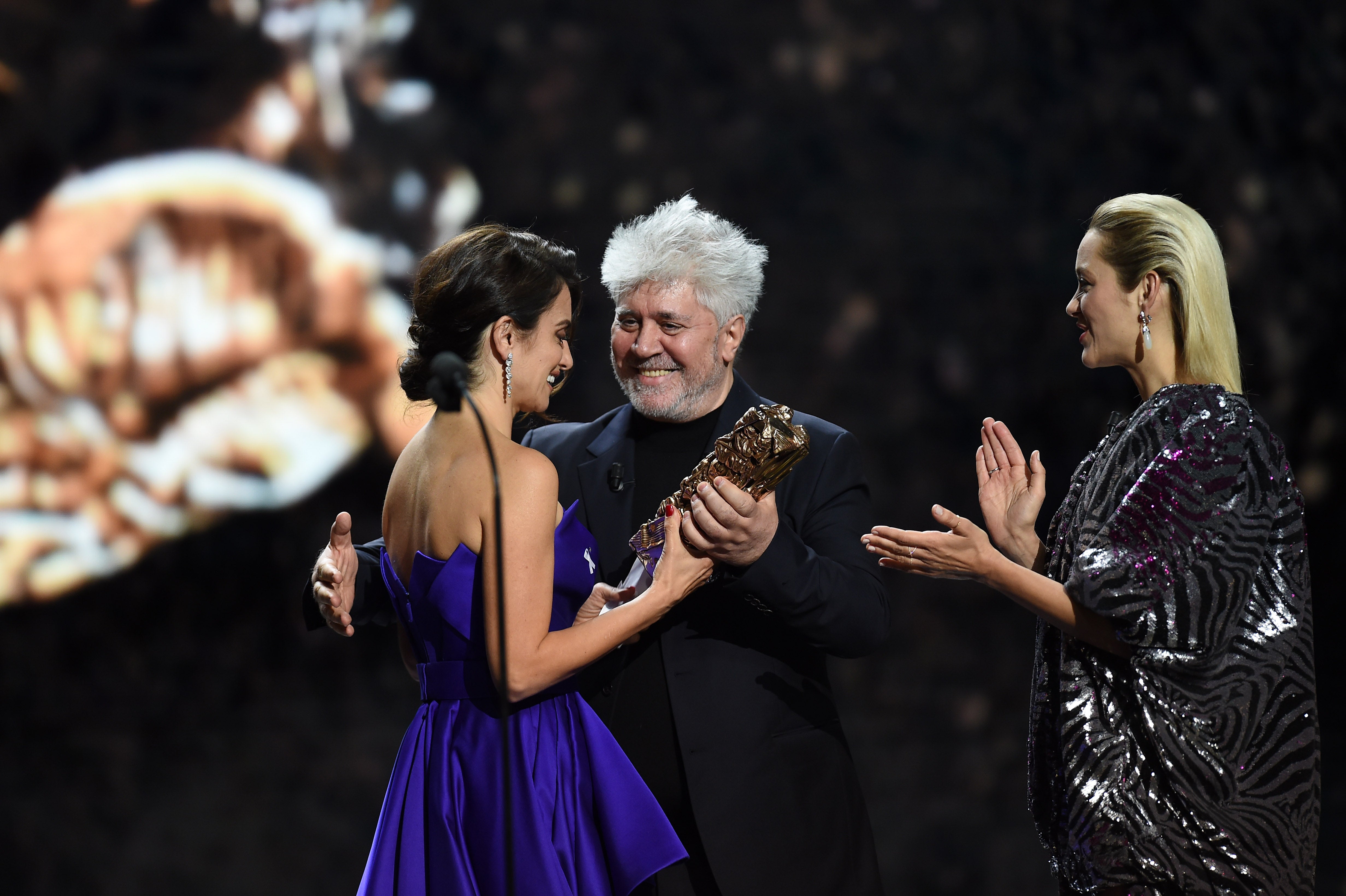Why Penelope Cruz deserves to win this year’s Best Actress Oscar
The striking Spanish star can next be seen in Pedro Almodovar’s ‘Parallel Mothers’, and it’s one of her most complex, spellbinding roles to date, writes Geoffrey Macnab

The first time he saw her on screen, he knew he wanted to work with her. It was the way she walked, her mix of beauty, charisma, elegance and fieriness. She was still very young but he realised she was very special. That was almost 30 years ago, in 1992. It would be a further five years until Penelope Cruz first appeared in one of Pedro Almodovar’s films – and then only in a small part. However, the duo have gone on to complete eight features together. He no longer worries if she is too young, too old, too wild or too tame. “Penelope can do everything; she has become an eternal, ageless woman,” he wrote of her in 2009.
Cruz is now to Almodovar what Marlene Dietrich was to Josef von Sternberg; what Bill Murray is to Wes Anderson; what Frances McDormand is to the Coen Brothers. She gives him the confidence to push ever further in his explorations of feminine identity. In return, he provides her with roles to die for. Their latest collaboration, Parallel Mothers, out in the UK next month, is one of their most striking yet.
Cruz, who has already won the Best Actress Award for the film at the Venice Festival, is now being strongly tipped for another Oscar nomination.
“This is the most difficult character that Penelope Cruz has ever played, and probably the most painful. The result is splendid,” Almodovar notes approvingly of his muse’s latest performance.
Cruz plays Janis, a top fashion photographer who becomes pregnant after a fling with a married man. She will have to bring up the baby on her own but that doesn’t daunt her. In hospital, waiting to give birth, she meets another expectant single mother, Ana (Milena Smit), far younger than her and who bitterly regrets being pregnant. They become firm friends. Then, the complications and outrageous plot reversals begin in earnest.
Parallel Mothers has all the ingredients found in old Hollywood tearjerkers about babies switched at birth and heroic, kind-hearted moms trying to do the right thing in difficult circumstances. At the same time, though, Almodovar is probing into the dark secrets of the Spanish civil war. Janis is searching for the remains of missing relatives who died at the hands of General Franco’s fascists and were buried anonymously in mass graves.
The film shows off Cruz’s multiple strengths. Janis is steely and very glamorous. She belongs in several different worlds at once. She is part of the media elite and yet has a close connection with the rural Spain of her ancestors. As so often in her films with Almodovar, Cruz is both an idealised, Virgin Mary-like figure and a flawed, down-to-earth woman with strong, sensual desires. She is a modern figure, a mother who has a successful career and is quite capable of coping without the support of a family or husband, but she never ignores her roots.
“Every single movie I’ve done for Pedro, I was either a mother or I was pregnant or I was giving birth in a bus,” Cruz recently told the US trade publication Deadline.
Almodovar, meanwhile, likens Cruz to “fiery” Italian stars such as Anna Magnani and Sophia Loren but also refers to her character’s “sense of guilt”. Janis is a complex and contradictory figure who isn’t as open as she seems.

Cruz’s force of personality is apparent. She may have a chiselled, delicate beauty that has led some critics to compare her to an Iberian Audrey Hepburn, but she completely dominates the film. It’s not as if she tries to undermine her co-stars. There are none of the scene-stealing antics you see from more flashy actors. In her moments with the younger mother, she is kindly and self-effacing. Almodovar being Almodovar, the relationship between the two women has a sexual element.
Cruz has been a star for a very long time. The British Film Institute held a retrospective of her films well over a decade ago, an honour only usually accorded to actors and directors late in their careers, but Cruz, born in Alcobendas, a Madrid suburb in 1974, was then still in her thirties.
Katrina Bayonas, the English-born head of Madrid-based talent agency Kuranda, discovered Cruz as a teenager after an open talent audition in the early 1990s. “She was 13 when we did the audition and 14 when we started working together,” Bayonas tells me. “Even at that tender age, there she was. She was working as a model to pay for her acting classes aged 13. Who does that? She had been studying ballet since was very young. Her mother said she was so full of energy they had to find a way to get rid of it and so ballet was the way.” The agent knew immediately that Cruz was an “exceptional” talent.
The way Spanish filmmakers used Cruz early in her career wasn’t especially imaginative. She was invariably the voluptuous young sex symbol. Bigas Luna almost cast her in his 1990 film The Ages of Lulu, about a young woman’s sexual awakening, but she herself decided she wasn’t old enough for such an explicit role. (“She was such a sensible teenager,” Bayonas remembers). She did star, though, in Luna’s 1992 erotic comedy-melodrama, Jamon Jamon, in which she appeared opposite an equally youthful Javier Bardem (eventually to become her husband). Cruz played Silvia, a beautiful young seamstress at an underwear factory in a small desert town. The men can’t stop gawping and pawing at her.

Director Fernando Trueba was one of the first to realise just how driven the young star was. “She was very serious from the beginning,” Trueba remembers working with her for the first time when she was still 18. “She prepared, she worked a lot. She was a perfectionist… and she still is.”
Trueba had seen her in Jamon Jamon and initially decided she was completely wrong for her role as Luz, the innocent young ingenue in his Oscar winner, Belle Epoque (1992). At first, he refused even to audition her.
“He [Trueba] called me and said no, no, no,” Bayonas recalls. “Just so you understand, I am looking for the antithesis of Penelope Cruz. She should never play my virginal Luz.” Bayonas sent him a tape of Cruz anyway. He saw the tape and changed his mind immediately.

Almodovar was likewise quick to realise Cruz’s ability and range. He first cast her in his 1997 film, Live Flesh. It wasn’t a major role but it was a very striking and unusual one. She plays an impoverished, hugely pregnant prostitute being rushed to the hospital by a friend on a dark, wet Madrid night in 1970. The friend waves down a municipal bus. When her waters break, the driver very reluctantly assists in the birth. It’s one of those typical Almodovar moments that straddle tragedy and comedy. It also enabled Cruz to get away from playing objects of male fantasy. Whereas other directors accentuated her glamour, he showed her covered in sweat and blood, with her friend biting off her umbilical cord. “She’s a very visceral actress. She brings a lot of truth to everything she does,” Almodovar recently noted of her willingness to play characters in extreme situations.

One of the paradoxes about Cruz’s international career is that her reputation has grown in spite of a surprising number of flops. At times, she seems critic-proof. She was cast opposite Nic Cage in John Madden’s Second World War-set romantic drama, Captain Corelli’s Mandolin (2001), but the film did only mediocre business. Other English-language movies from that period were likewise disappointments. Billy Bob Thornton’s Cormac McCarthy adaptation All the Pretty Horses (2000), co-starring Matt Damon, suffered from the feuding between its director and its distributor, Harvey Weinstein. Cameron Crowe’s Vanilla Sky (2001), a remake of her Spanish hit Open Your Eyes that paired her with Tom Cruise, was modestly profitable but received lacklustre reviews. Drug smuggling drama Blow (2001), in which she co-starred with Johnny Depp, barely covered its costs.
Cruz has managed to escape judgement on her sometimes questionable choices, too. Neither her much-publicised relationship 20 years ago with the then married Tom Cruise nor her long working association with the now disgraced Hollywood mogul Weinstein caused any media backlash against her. Quite the opposite. In Cruz’s home country, Bayonas tells me, she is cherished as “the Queen of Spain” (to borrow the title of one of her films with Trueba).
Although Cruz won a Best Supporting Actress Oscar for Woody Allen’s Vicky Cristina Barcelona (2009), her roles in big international movies have rarely stretched her. Only in the Almodovar collaborations do we get to see Cruz in the raw.
“I just think Pedro is smitten by her, always has been. She is equally smitten by him. He feels she can do anything… and he’s right!” Bayonas, the woman who “discovered” Cruz all those years ago, says of one of art house cinema’s greatest double acts.
The only nagging disappointment is that they don’t work together yet more often.
‘Parallel Mothers’ is released on 28 January






Join our commenting forum
Join thought-provoking conversations, follow other Independent readers and see their replies
Comments